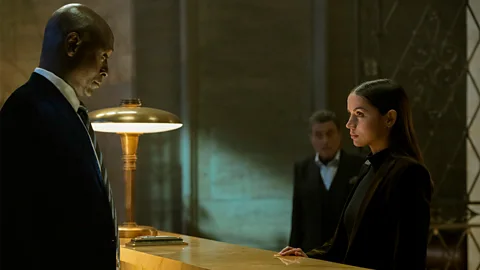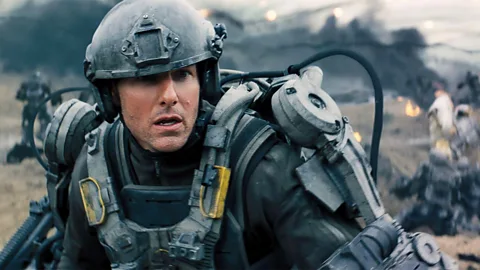 Lionsgate
LionsgateAction blockbuster From the World of John Wick: Ballerina has been one of the summer’s big flops so far – and its muddled title could be to blame.
Last week saw the release of From the World of John Wick: Ballerina – a spin-off of the Keanu Reeves gun-fu series – but you’d be forgiven for not noticing. The film had an underwhelming opening weekend at the US box office, making just $24m (£17.8m). That amount has since climbed to $41.8m (£31m), but it’s still a disappointing figure for the film’s studio, Lionsgate, considering the $90m (£66.8m) budget. Several factors may have been responsible.
From the World of John Wick: Ballerina is a vehicle for Ana de Armas, and female-centred action films are a difficult sell. The release was pushed back to make time for reshoots: if it had come out closer to de Armas’ explosive turn in the 2021 Bond film No Time To Die, as initially planned, cinema-goers might have been more intrigued. Additionally, last year’s John Wick television spin-off, The Continental, lasted just three episodes before being cancelled – a sign of potential franchise fatigue, or that it’s Reeves’ central character that fans love in these films rather than the world he occupies. But there’s another factor that can’t be ignored: the title.
“Ballerina doesn’t scream action film,” wrote film-industry news site Deadline in their analysis. “If you want to make a ton of money, maybe don’t call your hardcore action movie Ballerina,” echoed film commentator Mark Harris. Fans on Reddit have come to a similar conclusion: “Would your average moviegoer unplugged from the [media] hype know it’s full of kick-ass fight scenes, from that word on a poster, on a cinema marquee?” asked one commenter, to plenty of upvotes.
A glimpse at the marketing of the film suggests that Lionsgate anticipated this exact problem during its production. The film – about a pirouetting murder machine, directed by Underworld’s Len Wiseman – was titled Ballerina when purchased as a spec script in 2017. But as shooting wrapped and the release date approached, the studio began to tinker. In the last year, the film’s official title has changed from Ballerina to John Wick Presents: Ballerina to, finally, From the World of John Wick: Ballerina – an attempt to put Reeves’ beloved hitman front and centre, despite him having only a small cameo in the film.
But that still leaves the word “Ballerina” – it’s now just “Ballerina” with too many other words bolted on. Tom Lashley of Gower Street Analytics, a firm that tracks and predicts box-office performance, believes that this might well have contributed to the tumbleweeds blowing in Ballerina screenings last weekend. As a title, it “lacked any sort of sell”, he tells the BBC. “So the studio began tacking the name John Wick onto it in more and more aggressive ways, in an attempt to pull in more awareness. For me, it’s never a good sign when things are getting renamed like that.”
 Larry D. Horricks/ Lionsgate
Larry D. Horricks/ LionsgateThere’s precedent when it comes to Hollywood studios accidentally sabotaging their own releases by failing to land on titles with the right kind of appeal. Edge of Tomorrow (2014), starring Tom Cruise, was adapted from a Japanese novel entitled All You Need Is Kill, but as the producer of the time-twisting science-fiction thriller, Edwin Stoff, told The Hollywood Reporter at the film’s premiere, “I think the word ‘kill’ in a title is very tricky in today’s world.” However, it was replaced by a title easily mistakable for a Lady Gaga track, revealing little of the film’s “Groundhog Day during an alien invasion” concept. Even the film’s fans were disgruntled, so when Edge of Tomorrow was released on DVD, the title was given less prominence than its tagline: “Live. Die. Repeat.”
On the other hand, swapping a bad title for a good one at the right moment can pay dividends. Pretty Woman was originally called Three Thousand, and then 3,000, because that’s how much the sex worker is paid by her employer: at that point, the film was a dark skewering of “economic imbalance… it wasn’t about sex work as much as an attack on out-of-control capitalism,” screenwriter J F Lawton explained in 2020. But Disney executives thought that it sounded like a science-fiction film. When Lawton’s screenplay was reconfigured as a fairy-tale romantic comedy, it was renamed Pretty Woman, a catchy title which referred to Roy Orbison’s song, Oh, Pretty Woman, and which was used to describe Julia Roberts in countless articles about the film’s breakout star.
 Alamy
AlamyTo Lashley, some of the best and most effective titles across film and TV are straightforward, distilling the story down to a single word – just as long as that word, unlike Ballerina, is the appropriate one. “[1990s sitcom] Friends was originally titled Across the Hall. It’s hard to imagine it would have been as successful with that name,” he says. The same might be said of the iconic Alien – or as it was originally titled, Star Beast, until screenwriter Dan O’Bannon realised that that name promised something more fantastical and Star Wars-esque than the lean, brutal horror Ridley Scott was creating. Ditto Casablanca – a film originally destined to hit cinemas as Everybody Come to Rick’s – and Beetlejuice, a film that Warner Bros pushed director Tim Burton to release under the imagination-less title House Ghosts. Burton pushed back by pretending to be dead set on calling the film Scared Sheetless. Warner backtracked: maybe Beetlejuice wasn’t such a bad name after all, they decided.
Sometimes, it seems, the protagonist’s distinctive name can be the answer, whether it’s Annie Hall – changed from Anhedonia – or Amélie, Moana or Barbie. Take the example of a film with the vague working title Scorn. It was shot, edited and prepped for release, but its star kept getting its name wrong in interviews, referring to it by his character’s name instead. Not a good sign. Executives at the studio financing the film decided to change the title now that buzz was building. That star was Keanu Reeves. The film was called, eventually, John Wick.









